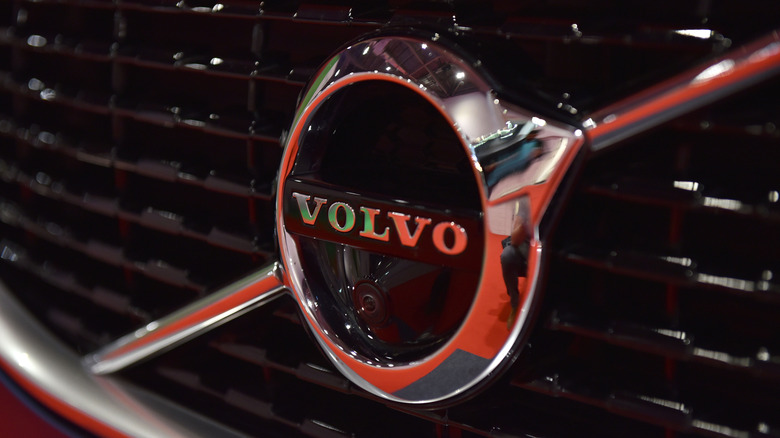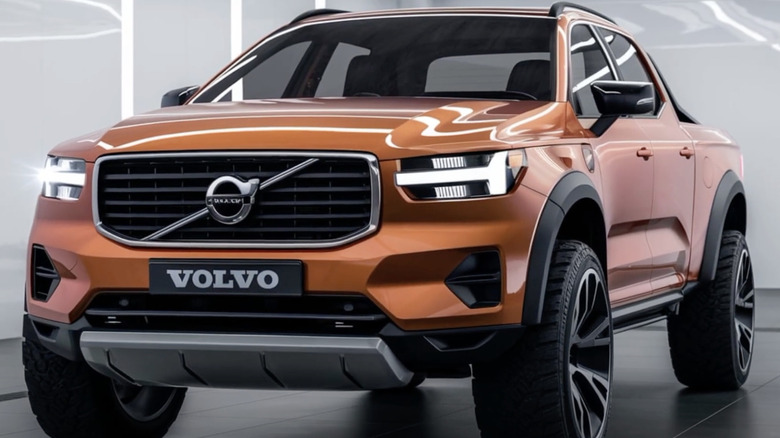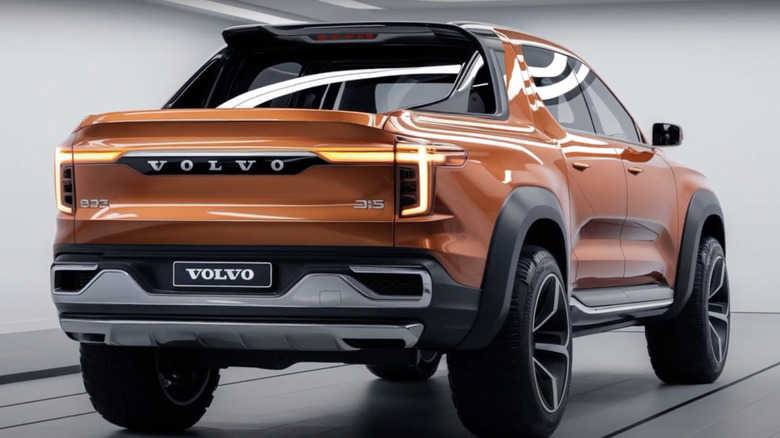Is Volvo Really Making A Pickup Truck?
Volvo is known for its solid selection of sedans, wagons, and SUVs. Among its largest markets outside Europe is the United States, where pickup trucks consistently dominate in vehicle sales. As of November 2024, stateside industry data reported a 14.3% increase in light truck sales, contrasting a 7.2% decline in passenger car sales. Notably, Volvo recorded a 5% bump in market performance during the same period, although this growth was unrelated to pickup truck sales.
Volvo cars, often categorized as entry-level luxury, are positioned as more affordable alternatives to brands like BMW and Mercedes-Benz. This strategic pricing has helped it find and maintain its niche in the market. In the United States, where Volvo operates over 300 dealerships, its top-selling models in 2024 include the XC90, XC60, and XC40 — all part of the company's SUV lineup.
While Volvo has established a strong presence in the SUV segment, its potential in the highly lucrative pickup truck market remains untapped. As such, consumers got excited when renders of a supposed Volvo pickup truck began circulating online. Given Volvo's reputation for producing durable and reliable vehicles, many truck enthusiasts could not help but look forward to the release of the brand's first-ever pickup offering. Unfortunately, these renders are fake.
Images of Volvo's pickup truck are circulating online
Recently, reports circulating on social media claimed that Volvo was releasing a pickup truck, even though the company itself had not announced anything. Such unfounded news stories appeared believable because they featured renders of the rumored vehicle. One video report made by YouTube channel Auto Land claimed the Volvo pickup would mark the brand's "bold and new entry" into the utility vehicle market.
According to the channel, Volvo was allegedly aiming to redefine adventure and style with this new offering. The images flashed in the video showed an orange pickup truck featuring Volvo's signature badge and prominent branding on the front fascia, reminiscent of the XC90. On the other hand, the truck's overall body design bears a striking resemblance to the latest Ford Ranger Raptor.
"From its sleek Scandinavian aesthetics to its rugged off-road performance, this truck is built to handle it all," Auto Land indicated in its fake video report. The narration in the clip further highlighted the vehicle's purported Thor's Hammer-style headlights and aerodynamic contours that allegedly give the truck a modern and refined appearance. The narrator also mentioned the truck's advanced safety features and adaptive suspension system, purportedly designed to ensure a smooth ride across challenging terrains and weather conditions. All of these detailed, yet fake descriptions helped build hype over the rumored release of the new vehicle.
The truth behind Volvo's pickup truck
While the renders may appear legitimate at first glance, they lack the refinement and polished characteristics of official designs for new vehicle models. A detailed inspection reveals inconsistencies, including uneven contours and curvatures of the car, unintelligible text and symbols on the instrument cluster and infotainment system, distorted depictions of the tires, and mismatched design elements on the pickup's rear.
Such flaws are the hallmarks of artificial intelligence and AI-generated images. The rise of AI-powered text-to-art tools has enabled anyone with access to these tools to easily create and disseminate misleading visuals online, often to generate traffic or spread misinformation. Beyond the rendering imperfections, the most compelling evidence debunking the Volvo pickup truck rumor lies in the company's strategic focus. Volvo has not indicated plans to release a pickup truck, and such a move appears highly unlikely to happen anytime soon.
The primary reason for this is the limited demand for pickups in Volvo's home market of Europe, where consumers overwhelmingly prefer smaller, more compact vehicles. Meanwhile, the U.S. market is already dominated by domestic brands such as Ford and Chevrolet, which offer high-quality, well-established pickup models. Unless Volvo intends to directly challenge these industry leaders, it is improbable that the company would invest in creating a pickup truck for the U.S., or any other overseas market, for that matter.


